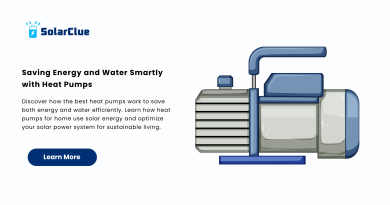Is Heat Pump Water Heater Eco Friendly?
Eco-friendly refers to products, practices, or services that are designed to have a minimal negative impact on the environment. In today’s world, where eco-friendly practices are becoming increasingly important, we must explore sustainable solutions for our everyday needs, including water heating. One such innovative technology that has gained prominence is the heat pump.
This blog will dive into the eco-friendly nature of heat pump water heaters and how they can contribute to an eco-friendly lifestyle while also saving you money in the long run.
Table of Contents
What is a Heat Pump?
A heat pump is a water heating device, to meet your daily hot water needs. It is energy-efficient, as it uses less electricity than other traditional water heaters. The difference lies in the working principle. Any traditional water heater, like a geyser, uses direct electricity to heat water. Whereas, a heat pump uses electricity to only transfer heat from one place to another. This heat is used to produce hot water, rather than electricity. A heat pump is one of the best sustainable ideas for the future.
How a Heat Pump System Works?

A heat pump works on the principle of transferring heat from one place to another.
This system consists of two main components: an indoor unit and an outdoor unit.
The outdoor unit has two parts – an exhaust fan and a compressor. The indoor unit is the storage tank, where water is stored.
The exhaust fan absorbs heat from the surrounding air, while the compressor compresses the refrigerant gas, increasing its temperature. This heated refrigerant gas then passes through a spiral condenser inside the indoor unit, transferring its heat to the water stored in the tank. This process continues until the desired water temperature is reached.
Unlike traditional geysers that use a significant amount of electricity to generate heat, heat pumps consume less energy by simply moving heat from one place to another. This makes them more energy-efficient and cost-effective in the long run.
How is Heat Pump Eco Friendly?
As a heat pump uses electricity only for the purpose of transferring heat, so it consumes 75% less electricity than a geyser. This reduces the electricity generation from non-renewable sources like fossil fuels. Burning of fossil fuels emit harmful pollutants, which cause air pollution and water pollution. Plus, this also increases carbon footprint, leading to greenhouse gas emissions.
Heat pump system heats water using heat absorbed from the outside. So it is using natural resource(heat from ambient air) to heat water. This reduces burning of fossil fuels, making it an environmentally friendly choice for Indians. And the additional benefit is that helps you save money.
What are the Other Benefits of Heat Pumps?
Beyond their eco-friendly credentials, heat pump water heaters offer several other advantages:
1. Cost-Effective
Heat pumps have high upfront cost. However, they make up for it through lower operating costs. Heat pumps transfer heat rather than generating it directly. This uses far less electricity – up to 75% less. Over its 10-15 year lifespan, a heat pump can save you hundreds or even thousands in energy costs. So it is actually a cheaper alternative to other traditional water heaters like geysers.
2. Long Lifespan
With proper maintenance, heat pumps last 15 years or more – significantly longer than standard electric geysers (8-10 years). So there is no need for replacement for a long time. This extended life cycle also contributes to it being a cost-effective option.
3. Reduced Water Wastage
Traditional water heaters constantly heat and reheat the same water, leading to significant energy losses. Heat pumps heat water more efficiently, so you don’t have to run the tap as long waiting for hot water. This conserves water, especially in households with long pipe runs.
4. Efficient in Cold Climates
One common misconception about heat pump water heaters is that they may not perform well in colder climates. However, modern heat pump water heaters are designed to be efficient even in low temperatures. They can effectively extract heat from the surrounding air, even when the temperature drops below freezing. This makes heat pump water heaters a viable and energy-efficient option for hot water needs in various climates, including colder regions.
5. Manual Temperature Setting
Most heat pumps allow you to change temperature as per your requirements. This ensures you have hot water when needed without wasting energy by overheating the water beyond your requirements.
6. Availability in Different Sizes
Heat Pumps normally have an indoor and an outdoor unit. But many homes in India, specially in big cities, may not have that space available. For that, a single-unit heat hump is designed. It is also called Integrated Heat Pump.
Conclusion
Adopting an eco-friendly lifestyle is not only beneficial for the environment but also for your wallet. Heat pumps are an excellent choice for those seeking an eco-friendly and cost-effective water heating solution. These systems represent a smart investment in sustainable living. Embrace the future of water heating and make the switch to a heat pump water heater today!
Visit SolarClue® to see the best heat pump water heaters. SolarClue® is an online marketplace where solar energy products are sold at discounts up to 50%.




